Share on your favorite
Or copy the link
Below are navigation links that will take you to the main text and navigation menus.
26,551 first names, 70,620 last names, 333,585 kanji variations.
one of the best Japanese name search tools for your baby!

Image by: Haikyu!! Official website ©Haruichi Furudate/Shueisha Inc・Haikyu!! Production committee, MBS
Contents
Haikyu!! is a popular sports manga series written and illustrated by Haruichi Furudate. Middle schooler Shoyo was deeply inspired by a high school volleyball player called the ‘Tiny Giant’ and hopes to be like him one day. When he finally made it into the ‘Karasuno High School’ where his role model used to go, Shoyo bumps into Tobio who defeated him badly at the middle school volleyball match. Unlike Shoyo, Tobio is a well known and talented student in the high school volleyball world. Despite their rivalry, together they develop an awesome new tactic and an unexpected bond. Along with their peers, they aim to reach the very top!
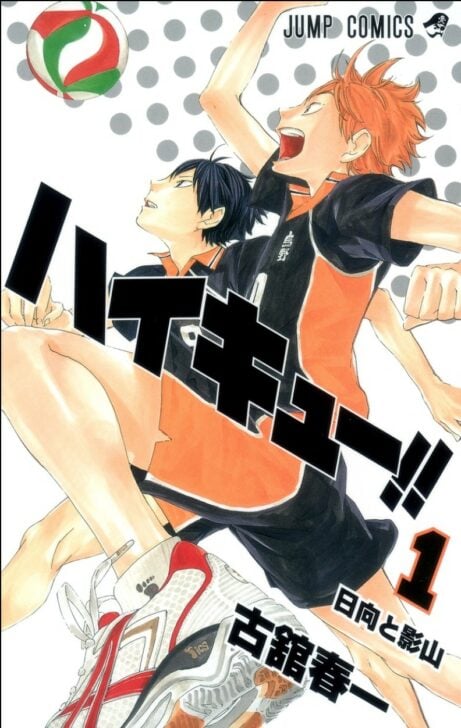
Image by: Haikyu!! Comic 1 ©Haruichi Furudate/Shueisha Inc—
It is also called ‘Haikyu!!'(ハイキュー!!) in the Japanese version. Haikyu means Volleyball in Japanese however the word ‘バレーボール, Barēbōru’ is more commonly used. You write the word ‘Haikyu’ in kanji as ‘排球’, ‘Hai'(排) means to push aside and ‘Kyu'(球) is a ball.

Image by: Haikyu!! Official website ©Haruichi Furudate/Shueisha Inc・Haikyu!! Production committee, MBS
In Japanese culture, names have significant meanings that are supposed to represent you as a person. Names can be expressed in hiragana, katakana, and kanji. Let’s find out the meanings of some names of characters from the Karasuno high school volleyball players!
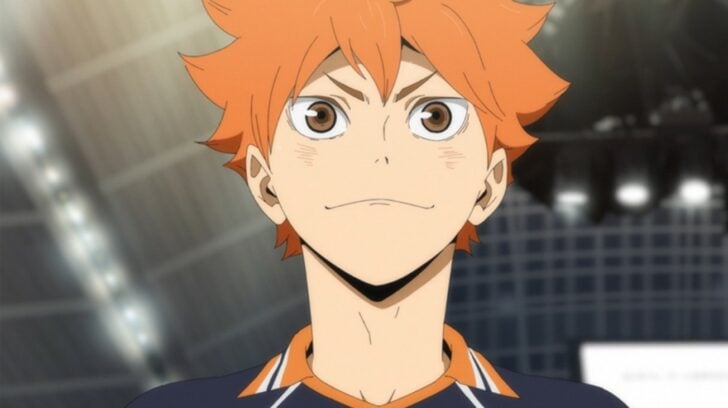
Image by: Haikyu!! Ep9 ©Haruichi Furudate/Shueisha Inc・Haikyu!! Production committee, MBS
Let’s start with the main character of the story Shoyo. He is sadly not gifted in his height but he has incredible stamina and the power to jump. ‘Hi'(日) means sun, ‘Nata'(向) means to face, when you put the two kanji together it becomes ‘Hinata'(日向) the sunny side. ‘Shou'(翔) means to soar, and ‘You'(陽) is sunlight. What an energetic name!
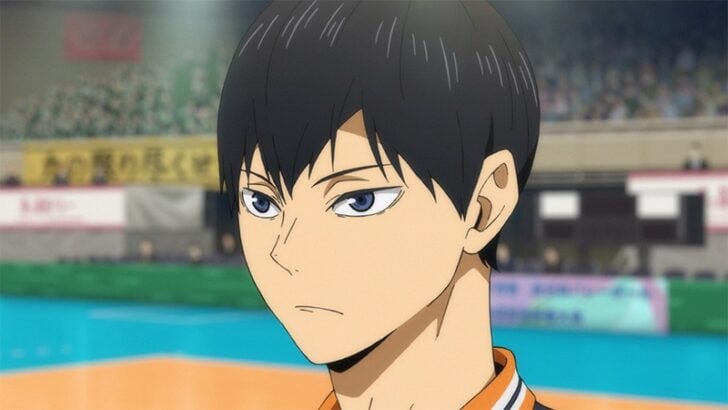
Image by: Haikyu!! Ep9 ©Haruichi Furudate/Shueisha Inc・Haikyu!! Production committee, MBS
Now let’s look into Tobio, the super talented volleyball player with an arrogant and self-centered attitude. ‘Kage'(影) means shadow, ‘Yama'(山) is a mountain, ‘Tobi'(飛) means to fly, and ‘O'(雄) means male and is a common ending for boy’s names.

Image by: Haikyu!! Ep11 ©Haruichi Furudate/Shueisha Inc・Haikyu!! Production committee, MBS
The tallest member of the Karasuno high school. He always keeps his cool and doesn’t really show interest in anything but if you watch him carefully you can tell that he truly enjoys volleyball! ‘Tsuki'(月) means moon, ‘Shima'(島) is an island, and ‘Kei(蛍) is firefly.
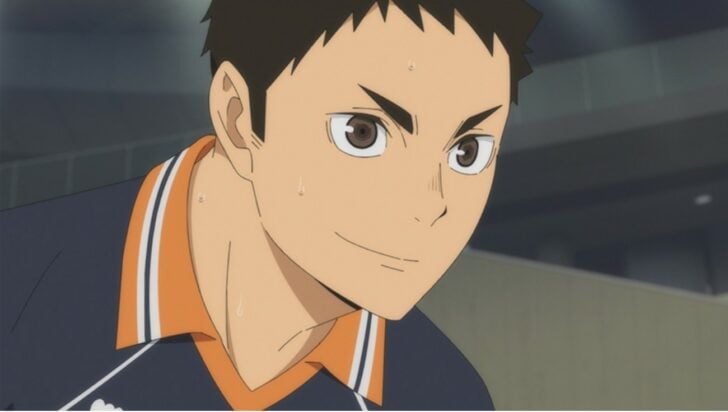
Image by: Haikyu!! Ep11 ©Haruichi Furudate/Shueisha Inc・Haikyu!! Production committee, MBS
Daichi is the captain of the Karasuno high school volleyball club. ‘Sawa'(澤) means swamp and ‘Mura'(村) is a village. His name ‘Daichi'(大地) means earth but when you look at the two kanji individually, ‘Dai'(大) means big and ‘Chi'(地) is ground.
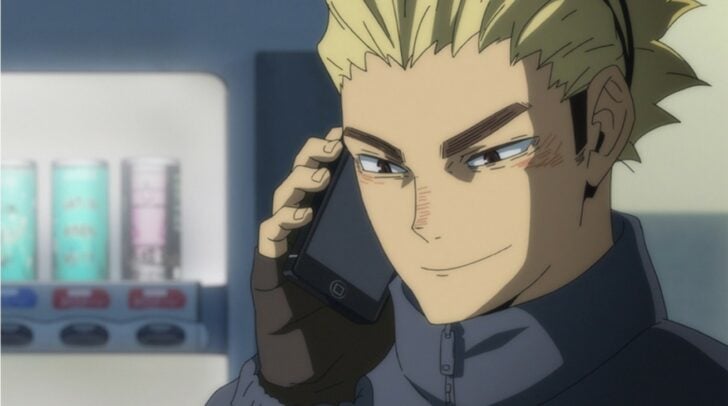
Image by: Haikyu!! Ep3 ©Haruichi Furudate/Shueisha Inc・Haikyu!! Production committee, MBS
Ukai is an alumn of the Karasuno volleyball team and currently the coach. ‘U'(鳥) means bird, ‘Kai'(養) means to feed, ‘Kei'(繋) means to connect, and ‘Shin(心) means heart.
Here are some useful phrases from Haikyu!! that will help you along with your Japanese studies!

Image by: Haikyu!! Comic 42 Ep 366 ©Haruichi Furudate/Shueisha Inc
The word ‘Tomodachi’ means friend and you can replace it with another word to explain that you are cheering on someone else. ‘Kita’(came) is the past tense of ‘kuru’(come). If you use this phrase a lot then you are a very supportive person for sure!

Image by: Haikyu!! Comic 1 Ep 1 ©Haruichi Furudate/Shueisha Inc
‘Mada’ means ‘Yet’, ‘Make’ means ‘Lose’ and ‘Nai’ Means ‘Not’. When people use this phrase they show their resilience. They work hard and never give up.
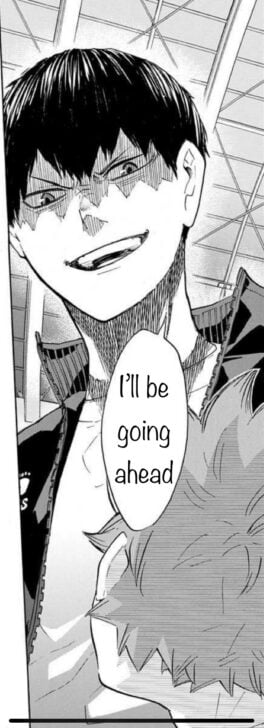
Image by: Haikyu!! Comic 24 Ep 208 ©Haruichi Furudate/Shueisha Inc
‘Saki’ means First or ahead, ‘Ni’ means To, and ‘Iku’ means Go. Boys usually add a ‘Ze’ at the end of the sentence to sound rough or cool.
Sort by: Most Relevant
Sorts names by how closely they match your search meaning. Names containing more kanji that match your search terms appear higher in the results.
Sort by: Most Kanji Variations
Sorts names by how many different kanji spellings they have. In general, names with more variants tend to be more familiar and widespread in Japan (with some exceptions).
Sort by: Most Viewed
Sorts names by page views on this site. Views reflect global traffic (including Japan), so this does not represent popularity among Japanese people only. A high view count does not necessarily mean the name is famous in Japan.
What is Hiragana?
Hiragana is one of the two Japanese syllabaries. Each character represents a sound (mora), not a meaning. It is used for native words, grammatical particles, verb/adjective endings (okurigana), and to show pronunciation above kanji (furigana). It developed from cursive forms of kanji.
What is Katakana?
Katakana is one of the two Japanese syllabaries. Each character represents a sound (mora), not a meaning. It is mainly used to write foreign words and names, loanwords, onomatopoeia, and for emphasis.
What is a Kanji Idea?
Kanji are Chinese characters used in Japanese writing. Unlike katakana and hiragana, each kanji character carries its own meaning.
When we convert your name into kanji, we select characters whose sounds match the Japanese pronunciation of your name, while also considering the meaning of each character. The result is a unique combination of kanji that both sounds like your name and carries meaningful symbolism.
We refresh the kanji combination each time you visit, so you can discover different options. If you find one you like, save it to your favorites!
What are English Syllables?
A syllable is a unit of pronunciation in English — it’s the beat you hear when you say a word.
Here are a few quick examples:
cat = 1 syllable
ba-by = 2 syllables
beau-ti-ful = 3 syllables
On this site, English Syllables show how a name naturally breaks into sounds when spoken in English. This helps you understand how English speakers naturally say the name and where they pause between sounds.
What are Japanese Morae?
A mora (plural: morae, Japanese: 拍 Haku) is the basic unit of sound in Japanese — think of it as one rhythmic “beat” when speaking.
Here are a few quick examples:
あ (a) = 1 mora
あい (a-i) = 2 morae
きょう (kyo-u) = 2 morae
On this site, Japanese Morae show how many “beats” a name has in Japanese. Most Japanese names have about 2–4 morae, which affects how natural and rhythmic the name sounds to native speakers.
This helps you see how the name fits into the natural rhythm of Japanese speech.
What is English Transcription?
“English transcription” (romanization) is the romanized form of a Japanese name, intended to reproduce its pronunciation as closely as possible. It is also useful for searching names on this site.
Japanese-Style Nicknames
In Japan, nicknames are used to express familiarity and affection. Typical features include:
Shortened forms: Names are often shortened for closeness, e.g., “Yuki” from “Yukiko” or “Taka” from “Takashi”.
Suffixes: Terms like “-chan” (often for girls, also for young children) and “-kun” (often for boys) are used among family and close friends. Among very close adults, “-chan” may still be used. More details
Use & context: Nicknames are informal—common among friends, family, or close colleagues—and are not suitable for formal or professional settings. Their use implies a certain degree of intimacy.
Long vowels: The long vowel mark “chōonpu” (ー) extends the preceding vowel. For example, “あーちゃん” (A-chan) lengthens the “あ” sound.
Households
Sorts surnames by the estimated number of Japanese households that use them. More households generally indicates a more common or well-known surname.
About our last-name data

Success
Migration completed successfully!